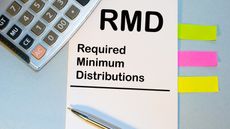18 States With Scary Death Taxes
Federal estate taxes are no longer a problem for all but the extremely wealthy, but several states have their own estate taxes and inheritance taxes that could still hit your heirs.
- (opens in new tab)
- (opens in new tab)
- (opens in new tab)
- Newsletter sign up Newsletter


Most people shouldn't be afraid of federal "death taxes." For 2023, only estates worth $12.92 million or more ($24.12 million or more for a married couple) are slashed by federal estate taxes, and only a small percentage of Americans have accumulated that much wealth. Plus, there's no federal inheritance tax to spook your heirs. (Estate taxes are paid by the estate and based on the estate's overall value, while inheritance taxes are paid by an individual heir on whatever property they inherit.)
But don't feel too comfy if your assets are below the federal estate tax threshold — a tax bill from your state could be lurking in the shadows. While a number of states have reduced or eliminated their death taxes over the past decade or so to dissuade well-off retirees from moving to more tax-friendly jurisdictions, 12 states and the District of Columbia still impose an estate tax and six states have an inheritance tax on the books. (Maryland has both!) So if you don't know boo about death taxes and live in one of the states listed (alphabetically) below, beware. Your heirs could be haunted by a state tax collector.
[Yours free, New Tax Rules for 2023. Download your free issue of The Kiplinger Tax Letter (opens in new tab) today. No information is required from you.]

Connecticut
- Estate tax: Yes
- Estate tax exemption level: $12.92 million
- Estate tax rates: 11.6% or 12%
- Inheritance tax: No
- Inheritance tax rates: N/A
- Go to Connecticut's full state tax profile (opens in new tab)
The Constitution State's estate tax exemption amount is $12.92 million for 2023 (i.e., the same amount as the federal estate tax exemption). The tax due is limited to $15 million.
Connecticut is the only state with a gift tax on assets you give away while you're alive. If you made taxable gifts during the year, state law requires that you file a Connecticut estate and gift tax return to identify such gifts. However, taxes are due in 2023 only when the aggregate value of gifts made since 2005 exceeds $12.92 million.
The state imposes estate and gift taxes at a flat 12% rate.

District of Columbia
- Estate tax: Yes
- Estate tax exemption level: $4,528,800
- Estate tax rates: 11.2% - 16%
- Inheritance tax: No
- Inheritance tax rates: N/A
- Go to the District of Columbia's full state tax profile (opens in new tab)
For 2023, Washington, D.C., estates valued over $4,528,800 are subject to a city estate tax. Estate tax rates in the nation's capital for 2023 range from 11.2% to 16%.

Hawaii
- Estate tax: Yes
- Estate tax exemption level: $5.49 million
- Estate tax rates: 10% - 20%
- Inheritance tax: No
- Inheritance tax rates: N/A
- Go to Hawaii's full state tax profile (opens in new tab)
At $5.49 million, the Aloha State has one of the higher state estate tax exclusion amounts, and it isn't adjusted annually for inflation. That makes the tax less frightening for Hawaii residents.
The current Hawaii estate tax rates range from 10% to 20%. The highest rate is for estates worth more than $10 million.

Illinois
- Estate tax: Yes
- Estate tax exemption level: $4 million
- Estate tax rates: 0.8% - 16%
- Inheritance tax: No
- Inheritance tax rates: N/A
- Go to Illinois' full state tax profile (opens in new tab)
Since Illinois is one of the least taxpayer-friendly states in the country for retirees, you shouldn't be startled to hear that it has an estate tax. The exemption amount is $4 million (after inclusion of adjusted taxable gifts), which at least isn't too frightening. The exemption amount isn't adjusted annually for inflation, either.

Iowa
- Estate tax: No
- Estate tax exemption level: N/A
- Estate tax rates: N/A
- Inheritance tax: Yes
- Inheritance tax rates: 2% - 6%
- Go to Iowa's full state tax profile (opens in new tab)
The Hawkeye State is in the process of phasing-out it's inheritance. However, it won't be completely eliminated until 2025. In the meantime, the tax doesn't apply if the estate as a whole is worth less than $25,000. In addition, no tax is due on property inherited by a spouse, parent, grandparent, great-grandparent, children, stepchild, grandchild, great-grandchild or other lineal ascendant or descendant.
The tax can be hair-raising for other heirs, though. For 2023, brothers, sisters, sons-in-law and daughters-in-law will be hit with a 2% to 4% tax, depending on the value of the property they inherit. Uncles, aunts, nieces, nephews and all other people inheriting property are taxed at rates ranging from 4% to 6%. (The rates will be lower in 2024, and the tax will then be repealed in 2025.)

Kentucky
- Estate tax: No
- Estate tax exemption level: N/A
- Estate tax rates: N/A
- Inheritance tax: Yes
- Inheritance tax rates: 4% - 16%
- Go to Kentucky's full state tax profile (opens in new tab)
As with other inheritance tax structures, the amount of Kentucky inheritance tax owed depends on the heir's relationship to the person who died and the value of the inherited property.
The tax isn't scary at all for the decedent's spouse, parents, children, grandchildren and siblings. They don't have to pay the tax.
But it can be a nightmare for other heirs. Nieces, nephews, daughters-in-law, sons-in-law, aunts, uncles and great-grandchildren are taxed at rates ranging from 4% to 16%, depending on the value of the property inherited (the first $1,000 of property is exempt). All other heirs are taxed at rates ranging from 6% to 16% (their exemption is only for the first $500 of property).

Maine
- Estate tax: Yes
- Estate tax exemption level: $6.41 million
- Estate tax rates: 8% - 12%
- Inheritance tax: No
- Inheritance tax rates: N/A
- Go to Maine's full state tax profile (opens in new tab)
The Pine Tree State has one of the less-scary estate taxes, because it only applies to estates worth $6.41 million or more for 2023 (the exemption amount is adjusted each year for inflation). Since most estates aren't that valuable, Maine's tax doesn't ensnare many estates.
Maine's estate tax rates are comparatively reasonable, too. The top rate is only 12%, which is tied with Connecticut for the lowest top rate in the nation.

Maryland
- Estate tax: Yes
- Estate tax exemption level: $5 million
- Estate tax rate: 0.8% - 16%
- Inheritance tax: Yes
- Inheritance tax rates: 10% (flat rate)
- Go to Maryland's full state tax profile (opens in new tab)
The Free State's estate tax exemption is $5 million in 2022, plus any predeceased spouse's unused exclusion amount. Rates range from 0.8% to 16%.
While Maryland also has an inheritance tax (with a flat 10% rate), the list of heirs exempt from paying it includes the decedent's spouse, parents, grandparents, children, grandchildren, siblings, son-in-law, daughter-in-law and surviving spouse of a deceased child. In addition, property not exceeding $1,000 passing to any one person is not subject to the tax.

Massachusetts
- Estate tax: Yes
- Estate tax exemption level: $1 million
- Estate tax rates: 0.8% - 16%
- Inheritance tax: No
- Inheritance tax rates: N/A
- Go to Massachusetts' full state tax profile (opens in new tab)
One of only two states with its exemption stuck at $1 million, the Bay State is less friendly to estates than most other states, including neighboring northeastern states that also made our list, such as Rhode Island and Connecticut.
There is an unlimited marital deduction for property left to a surviving spouse and an unlimited charitable deduction for property left to a qualified charity.

Minnesota
- Estate tax: Yes
- Estate tax exemption level: $3 million
- Estate tax rates: 13% - 16%
- Inheritance tax: No
- Inheritance tax rates: N/A
- Go to Minnesota's full state tax profile (opens in new tab)
The North Star State's exemption is $3 million.
But Minnesota looks back to include as part of your estate any taxable gifts made within three years prior to death. Tax rates range from 13% to 16%.

Nebraska
- Estate tax: No
- Estate tax exemption level: N/A
- Estate tax rates: N/A
- Inheritance tax: Yes
- Inheritance tax rates: 1% - 15%
- Go to Nebraska's full state tax profile (opens in new tab)
With Nebraska's inheritance tax, the closer the heir's relationship to the decedent, the smaller the tax rate and the greater the exemption (surviving spouses are exempt from the tax). For example, the tax on heirs who are immediate relatives (e.g., parents, grandparents, siblings, children and other lineal descendants) is only 1% and does not apply to property that is worth less than $100,000.
For remote relatives (e.g., uncles, aunts, nieces, nephews), the tax rate is 11% and the exemption amount is $40,000. For all other heirs, the tax is imposed at an 15% rate on property worth $25,000 or more.
However, regardless of the heir's relationship to the decedent, the state's inheritance tax does not apply to heirs 21 years of age or younger.

New Jersey
- Estate tax: No
- Estate tax exemption level: N/A
- Estate tax rates: N/A
- Inheritance tax: Yes
- Inheritance tax rates: 11% - 16%
- Go to New Jersey's full state tax profile (opens in new tab)
New Jersey imposes an inheritance tax on inherited property with a value of $500 or more.
No tax is imposed on transfers to the decedent's spouse, domestic partner, parents, grandparents, children and their descendants, or step-children (step-grandchild and their descendants are not exempt). The first $25,000 of property inherited by a decedent's sibling, son-in-law or daughter-in-law is also exempt. After that, they must pay the inheritance tax at rates ranging from 11% to 16%. All other individual heirs pay a 15% tax on the first $700,000 of inherited property and a 16% tax on everything over $700,000.

New York
- Estate tax: Yes
- Estate tax exemption level: $6.58 million
- Estate tax rates: 3.06% - 16%
- Inheritance tax: No
- Inheritance tax rates: N/A
- Go to New York's full state tax profile (opens in new tab)
For 2023, estates exceeding $6.58 million are subject to New York's estate tax (the exemption threshold is adjusted each year for inflation). Taxable gifts made by the decedent as a New York resident within three years prior to death are included as part of the estate. Tax rates range from 3.06% to 16%.
The New York estate tax is a "cliff tax." That means if the value of the estate is more than 105% of the current exemption, the exemption won't be available and the entire estate will be subject to state estate tax.

Oregon
- Estate tax: Yes
- Estate tax exemption level: $1 million
- Estate tax rates: 10% - 16%
- Inheritance tax: No
- Inheritance tax rates: N/A
- Go to Oregon's full state tax profile (opens in new tab)
The Beaver State is the most frightening place in the U.S. to die if you're concerned about estate taxes. Oregon has resisted the trend to raise its estate tax exemption (or even adjust it for inflation). The state's estate tax still kicks in for estates valued at as little as $1 million. In addition, it also imposes a relatively high 10% tax rate on even the smallest of qualifying estates.

Pennsylvania
- Estate tax: No
- Estate tax exemption level: N/A
- Estate tax rates: N/A
- Inheritance tax: Yes
- Inheritance tax rates: 4.5% - 15%
- Go to Pennsylvania's full state tax profile (opens in new tab)
The Keystone State has an inheritance tax, but it doesn't apply to property inherited by the decedent's spouse, parents (if the decedent is age 21 or younger), or child age 21 or younger. There's also no tax on property inherited from a member of the military who died as a result of an injury or illness received while on active duty.
The tax is imposed at a 4.5% rate for the decedent's parents (except if the decedent is 21 years old or younger), grandparents, lineal descendants, son-in-law, or daughter-in-law. The rate is 12% for people who inherit property from a sibling and 15% for all other heirs.
A 5% discount is allowed if the tax is paid within three months of the decedent's death.

Rhode Island
- Estate tax: Yes
- Estate tax exemption level: $1,733,264
- Estate tax rates: 0.8% - 16%
- Inheritance tax: No
- Inheritance tax rates: N/A
- Go to Rhode Island's full state tax profile (opens in new tab)
Although the Ocean State adjusts its estate tax exemption annually for inflation, it still has a fiendishly low threshold. At only $1,733,264 for 2023, Rhode Island's exemption amount is one of only three in the nation that is less than $2 million. Rates range from 0.8% to 16%.

Vermont
- Estate tax: Yes
- Estate tax exemption level: $5 million
- Estate tax rate: 16% (flat rate)
- Inheritance tax: No
- Inheritance tax rates: N/A
- Go to Vermont's full state tax profile (opens in new tab)
Vermont has an estate tax with an exemption of $5 million. The estate tax rate in the Green Mountain State is a flat 16%.

Washington
- Estate tax: Yes
- Estate tax exemption level: $2.193 million
- Estate tax rates: 10% - 20%
- Inheritance tax: No
- Inheritance tax rates: N/A
- Go to Washington's full state tax profile (opens in new tab)
An estate tax is imposed by Washington on estates exceeding $2.193 million (the exemption threshold is subject to adjustment each year for inflation). Tax rates range from 10% to 20%.
The state offers an additional $2.5 million deduction for family-owned businesses valued at less than $6 million.

Bob is a Senior Online Editor at Kiplinger.com. He has more than 40 years of experience in online, print and visual journalism. Bob has worked as an award-winning writer and editor in the Washington, D.C., market as well as at news organizations in New York, Michigan and California. Bob joined Kiplinger in 2016, bringing a wealth of expertise covering retail, entertainment, and money-saving trends and topics. He was one of the first journalists at a daily news organization to aggressively cover retail as a specialty, and has been lauded in the retail industry for his expertise. Bob has also been an adjunct and associate professor of print, online and visual journalism at Syracuse University and Ithaca College. He has a master’s degree from Syracuse University’s S.I. Newhouse School of Public Communications and a bachelor’s degree in communications and theater from Hope College.
-
-
 Longevity: The Retirement Problem No One Is Discussing
Longevity: The Retirement Problem No One Is DiscussingMany people saving for retirement fail to take into account how living longer will affect how much they’ll need once they stop working. What should they do?
By Brian Skrobonja, Chartered Financial Consultant (ChFC®) • Published
-
 Capital Gains Taxes Trap: How to Avoid Mutual Fund Tax Bombs
Capital Gains Taxes Trap: How to Avoid Mutual Fund Tax BombsIt’s bad enough when your mutual fund’s assets lose value, but owing unexpected capital gains taxes after those losses is doubly frustrating.
By Samuel V. Gaeta, CFP® • Published
-
 5 Stocks to Sell or Avoid Now
5 Stocks to Sell or Avoid Nowstocks to sell In a difficult market like this, weak positions can get even weaker. Wall Street analysts believe these five stocks should be near the front of your sell list.
By Dan Burrows • Published
-
 Best AI Stocks to Buy: Smart Artificial Intelligence Investments
Best AI Stocks to Buy: Smart Artificial Intelligence Investmentstech stocks AI stocks have been bloodied up in recent months, but the technology's relentlessly growing importance should see the sun shine on them again.
By Tom Taulli • Published
-
 9 Best Stocks for Rising Interest Rates
9 Best Stocks for Rising Interest Ratesstocks The Federal Reserve has been aggressive in its rate hiking, and it's likely not done yet. Here are nine of the best stocks for rising interest rates.
By Jeff Reeves • Published
-
 The 6 Safest Vanguard Funds to Own in a Bear Market
The 6 Safest Vanguard Funds to Own in a Bear Marketrecession Batten the hatches for continued market tumult without eating high fees with these six Vanguard ETFs and mutual funds.
By Kyle Woodley • Published
-
 9 Best Commodity ETFs to Buy Now
9 Best Commodity ETFs to Buy NowETFs These commodity ETFs offer investors exposure to the diverse asset class, which is a helpful hedge against inflation.
By Jeff Reeves • Last updated
-
 The 5 Best Inflation-Proof Stocks
The 5 Best Inflation-Proof Stocksstocks Higher prices have been a major headache for investors, but these best inflation-proof stocks could help ease the impact.
By Louis Navellier • Published
-
 New RMD Rules: Starting Age, Penalties, Roth 401(k)s, and More
New RMD Rules: Starting Age, Penalties, Roth 401(k)s, and MoreMaking Your Money Last The SECURE 2.0 Act makes major changes to the required minimum distribution rules.
By Rocky Mengle • Published
-
 7 Best Small-Cap Stocks to Buy for 2023 and Beyond
7 Best Small-Cap Stocks to Buy for 2023 and Beyondsmall cap stocks Analysts say a tough 2022 has left these small-cap stocks priced for outperformance in the new year and beyond.
By Dan Burrows • Published










